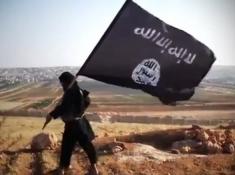Executive Summary
At about 2 a.m. on June 12, 2016, 29-year-old U.S. citizen Omar Mateen shot and killed 49 people and injured 53 more at Pulse, a gay nightclub in Orlando, Florida. Right before the attack, Mateen made a 911 call, during which he reportedly pledged allegiance to ISIS leader Abu Bakr al-Baghdadi. Following a shootout with police in which Mateen was killed, ISIS officially claimed responsibility for the attack, announcing that “an Islamic State fighter” had “targeted a nightclub for homosexuals.” (Sources: Washington Post, TIME)
The shooting was a brutal reminder of ISIS’s willingness and capacity to carry out an attack overseas—whether by radicalizing and inspiring individuals online to carry out so-called “lone-wolf” attacks, or by carefully building terror networks and providing operational support. The Orlando attack, which stands as the deadliest shooting on American soil, was also an echo of ISIS’s systematic hostility and persecution of gay people in Iraq and Syria.CEP aspires to use terminology as recommended by GLAAD (formerly the Gay and Lesbian Alliance Against Defamation). For more, see GLAAD’s resource: http://www.glaad.org/reference/lgbtq.
For example, in early May 2016, an ISIS court charged a young Syrian man with the “crime” of engaging in gay sex. In front of a crowd numbering in the hundreds in Manbij, Syria, ISIS fighters threw the young man from the top of a building as punishment for his so-called “crime.” This is but one case of how ISIS exploits pre-existing religious and social biases against gay people among the populations under its control in order to justify their persecution, a practice that has reportedly continued into 2017, despite territorial losses. (Sources: ARA News, Iraqi News, Daily Mail)


ISIS-appointed courts have declared gay sex a capital offense and order brutal punishments in line with an extremist reading of sharia (Islamic canonical law). One of the most common punishments has been to throw individuals off buildings. Those who survive the fall are then stoned to death by waiting crowds, which also include children. This eager participation in executions provides one example of the ingrained persecution facing gay people in the region, which, according to the International Gay and Lesbian Human Rights Commission, began well before ISIS began publicizing it. Human rights observers estimated in December 2015 that ISIS had executed at least 36 suspected gay men within its territory. In a single day in September 2015, ISIS reportedly executed 10 suspected gay men, including a 15-year-old boy. (Sources: CBS News, Mirror, Daily Mail)
Even as ISIS continues to lose territory in Iraq and faces increased assaults in Syria, the group has continued to persecute and murder gay men. ISIS’s religious police threw a blindfolded man from a rooftop in Aleppo, Syria. He survived the fall but was pelted to death with rocks by the crowd on the ground. In January 2017, ISIS executed a 17-year-old boy in Mosul, Iraq, by throwing him off a building. Another unidentified young man was thrown off a Mosul roof that March. The crowd below reportedly stoned the man until he died. ISIS has publicized images of both murders through affiliated accounts on social media. (Sources: Fox News, ARA News, Daily Mail)
To glorify and promote its systemic persecution of gay people, ISIS has released numerous videos, photos, and other propaganda showcasing public executions. ISIS often uses stolen cell phone and Facebook contacts from prisoners to round up other gay people. Some gay Syrians and Iraqis have fled their home countries fearing persecution by ISIS as well as by their own families. For that reason, human rights groups have referred to gay Syrians and Iraqis as “double refugees.” (Sources: BBC News, Daily Beast)
Quantifying the number of gay Syrian refugees remains difficult, as many Syrians refuse to openly identify as gay, fearful of persecution and discrimination. At least 216 LGBT Syrians have registered with the U.N. High Commissioner for Refugees (UNHCR).The organization does not require refugees to self-identify their sexual orientations. According to the gay-rights group Organization for Refuge, Asylum and Migration, Turkey and Lebanon are the most frequent destinations for gay refugees, largely due to proximity. It is estimated that at least 400 self-identified gay Syrians have escaped ISIS rule. The real number may in fact be much higher, however, as many refugees still refuse to identify openly as gay in Turkey and Lebanon. In August 2016, one gay Syrian refugee was beheaded in Turkey. The victim’s acquaintances and roommates also reported receiving death threats in connection to the attack. (Sources: Daily Beast, Newsweek, Guardian)
ISIS’s Victims: Profiles
While institutionalized homophobia in Iraq and Syria predates ISIS rule, gay men have suffered exceptional persecution and targeting under ISIS’s aegis. Survivors of ISIS’s persecution remain fearful, even outside of ISIS-held territory. Following are the stories of some of the many victims of ISIS’s persecution.
Targeting Gay People inside the So-Called Islamic State
ISIS’s Legal Rulings on Gay Sex
ISIS institutionalizes its persecution of gay people within the legal framework of its so-called caliphate. On December 15, 2014, ISIS released a penal code entitled, “Clarification [regarding] the Hudud [Koranic punishments].” The document details the punishment—according to sharia—for various illegal acts, including gay sex: “death for the person committing the act, as well as for the one receiving it.” ISIS claimed to have distributed the penal code as a reminder to people living in the “caliphate,” and warned that it will be vigilantly enforced. (Source: MEMRI)
Religious Roots of ISIS’s Persecution of Gay People
According to ISIS’s ideology, gay sex is an “affront to the fitrah” (natural human disposition). ISIS’s persecution of gay people is rooted in its extremist interpretations of the Quran and Islamic sources. According to one hadith (prophetic teaching), “When a man mounts another man, the throne of God shakes.” ISIS propaganda refers to gay people as belonging to the tribe of Lot, which the Quran accuses of causing the destruction of the biblical city of Sodom. According to the Quran 7:80, Lot said, “Do ye commit lewdness such as no people in creation (ever) committed before you? For ye practise your lusts on men in preference to women” and “are indeed a people transgressing beyond bounds.” (Sources: CNN, OutRight Action International, University of Southern California, Dabiq)
The Arabic word lewat (sodomy) is derived from the name Lot. ISIS reproduces this sort of rhetoric to reinforce its religious justification for its anti-gay policies and portray gay people as acting against God. On August 3, 2015, for example, ISIS released a photo report from its Aljazeera Province in Iraq titled, “The imposition of Sharia ruling against a person who committed the act of the people of Lot.” (Sources: CNN, OutRight Action International)

(Source: Syrian Observatory for Human Rights via New York Daily News)
The February 2015 issue of ISIS’s Dabiq, ISIS's online magazine, blames the West’s “sexual revolution” for plunging it into a “downward spiral of sexual deviance and immorality.” According to the article “Clamping Down on Sexual Deviance,” Allah’s messenger (the prophet Muhammad) said that “plague and disease that had never afflicted their ancestors” will afflict societies that embrace “sexual perversion.” Accordingly, ISIS attributes the rise of AIDS and other sexually transmitted diseases to the fulfillment of this prophesy. (Source: Dabiq)
According to Dabiq, ISIS seeks to implement “the rulings of Allah on those who practice any form of sexual deviancy or transgression,” in order to avoid the “same rotten course” as the West. The Quran dictates that two people guilty of “lewdness” should both be punished unless they repent, a construct that culminated in ISIS’s death penalty edict for homosexuality—but without the opportunity to “repent.” (Sources: Dabiq, University of Southern California)
The favored ISIS execution method—throwing gay people from tall buildings—also claims its origins in an extremist interpretation of disputed Islamic texts. According to ISIS’s ideology, a hadith about Muhammad’s companion, Abu Bakr as-Siddiqi, explains that he tossed sexual deviants from high points as punishment. An ISIS sharia court that sentenced a young Syrian man to death in May 2016 declared that this method of execution “will cleanse their sins.” Dr. Usama Hasan of the U.K.-based Quilliam Foundation asserted there is disagreement over the existence of such a hadith, which directly contradicts other passages of the Quran. (Sources: Dabiq, BBC News, ARA News)
Persecution of Gay People in ISIS-Controlled Territory
Gay men clearly live in fear that their families or acquaintances will betray them to ISIS. ISIS fighters have further sown suspicion and fear by reportedly posing as gay men to identify other gay men, who are then publicly executed or held for ransom. (Sources: New York Daily News, Associated Press)
ISIS Attacks against Gay People outside ISIS-Controlled Territory
ISIS and its supporters have called for—and claimed—attacks on gay people around the world. In the May 2017 issue of its online magazine Rumiyah, ISIS called for truck attacks targeting “Large Outdoor Festivals, Conventions, Celebrations, and Parades.” The terror group printed a picture of the 2015 San Francisco Gay Pride Parade to exemplify a prime setting for such an attack. ISIS and its supporters have called for attacks on gay people around the world. The most deadly homophobic attack claimed by ISIS abroad was Omar Mateen’s June 2016 rampage at an Orlando gay nightclub. (Source: Rumiyah)
Mateen was an American citizen and ISIS follower who perpetrated the deadliest terror attack on American soil since 9/11. In the early morning hours of June 12, 2016, Mateen gunned down 49 people and injured 53 more at Pulse, a gay nightclub in Orlando, Florida. Mateen reportedly pledged allegiance to ISIS leader Abu Bakr al-Baghdadi on Facebook—as well as in a call to 911—during the attack. (Sources: Washington Post, BBC News, CNN, Washington Post, Washington Post)
Later on June 12, ISIS took responsibility for the mass shooting, writing in a statement posted online that “an Islamic State fighter” had “targeted a nightclub for homosexuals.” On June 13, the terror group released another claim of responsibility through its affiliated Al Bayan radio station, referring to Mateen as “one of the soldiers of the caliphate in America.” In the May 2017 issue of Rumiyah, ISIS praised Mateen for “having … single-handedly slaughtered 49 sodomites.” (Sources: Time, SITE Intelligence, New York Times, NBC News, Rumiyah)
The Orlando attack is not the only case of anti-gay ISIS activity in the West. In February 2017, New Jersey police arrested Gregory Lepsky, later charging him with plans to build and detonate a pressure cooker bomb in New York City on behalf of ISIS. Family members describing Lepsky’s radicalization said that he had often espoused homophobic ideas, at one point suggesting that gay people should be killed. (Sources: Newsweek, U.S. Department of Justice, U.S. Department of Justice)
Persecution as Propaganda
ISIS’s media wing has released several statements, pictures, and videos highlighting the terrorist group’s persecution of gay people. For example, ISIS released a series of photos on August 3, 2015, documenting the trial and execution of a suspected gay person in Iraq. The images show the victim being thrown from the top of an industrial building. The report concludes with a request that readers pray for the wellbeing of ISIS fighters. ISIS has also released video footage of victims falling to their deaths. In one video of an execution in June 2015, four people are executed simultaneously. (Sources: OutRight Action International, Mirror, Agence-France Presse)
OutRight Action International documented 19 public executions between December 2014 and August 2015. ISIS’s media center corroborated these events with photo reports and videos, which have also been shared over social media by ISIS supporters. (Sources: OutRight Action International)
CEP has documented multiple threats against gay people on ISIS-affiliated channels and on encrypted messaging services. For example, in 2016, a pro-ISIS channel on the encrypted messaging service Telegram began circulating an image naming the June 2017 Toronto Gay Pride parade as an “excellent target.”

In June 2016, one ISIS-affiliated channel on Telegram encouraged ISIS supporters to “pick a target and start shooting” during Pride Month.

Before ISIS
Conditions for Gay People in Pre- and Post-ISIS Syria
The persecution of gay people is not a new phenomenon in Syria. While Syrian law makes the practice of gay sex illegal, conviction does not carry the death penalty. Article 520 of the Syrian Penal Code declares, “Any unnatural sexual intercourse shall be punished with a term of imprisonment of up to three years.” (Source: CNN)
In addition to legal repression, Syria’s gay population has been blamed for the spread of AIDS and other sexually transmitted diseases. Muhammad Abd Al-Satar Al-Sayyid, then deputy minister of Syria’s religious endowments, said during an August 30, 2005, television interview: “The only reason for this [epidemic] is the straying from the divine way regarding fornication … this means fornication, homosexuality, and all the sexual deviation it entails.” (Sources: UNAIDS, MEMRI)


“Nour,” a Syrian gay-rights activist based in Istanbul, believes that Syrians living under ISIS rule “might be a little bit excited or maybe happy to get rid of homosexuals.” Nour left Syria in 2012 because of institutional abuse he suffered during his teenage years.
Rebel groups opposed to Syrian President Bashar al-Assad have also targeted gay people since the beginning of Syria’s civil war in 2011. In September 2013 for example, two men, Karim and Tareq, were on a date in the city of Raqqa, Syria, when Karim was abducted, placed in a cell, and interrogated. His date, Tareq, had been a member of the Nusra Front pretending to be gay. The Nusra Front released Karim two weeks later after his family paid a ransom. (Sources: Newsweek, CNN, Daily Beast)
A Syrian Druze man going by the name “Rami” also fled the country for Beirut when he was 19. Rami kept his sexual identity a secret, revealing it only to a circle of gay friends. After the outbreak of the civil war, he received a call from a close gay friend who said he needed money for an emergency. When Rami went to his house in Damascus, he was met by a group of thugs who tortured him for hours. Rami escaped when the assailants attempted to load him into a car to take him to rebel-held territory. Rami believes the men belonged to the Nusra Front, though he was unable to positively identify them. Upon returning home, Rami fled across the Lebanese border. (Source: Vice)
Conditions for Gay People in Pre-ISIS Iraq
As in pre-ISIS Syria, the criminalization of gay sex existed in Iraq prior to the invasion of ISIS. A 2001 amendment to Iraq’s penal code made the crime punishable by death. The law has not been overturned since the ouster of Saddam Hussein and Iraqi society remains a relatively hostile environment for gay people. For example, Baghdad cleric Sheikh Ali Amar has called gay sex an “offence to Islam” and said that “anyone who behaves this way should be sentenced to death without compassion.” (Source: IRIN)
Gay men also faced persecution and the threat of death at the hands of Shiite militias in Iraq, years before ISIS swept out of the east and began capturing territory. “Mohammed” told Human Rights Watch in 2009 that the Mahdi Army had kidnapped his partner for several days. When he was returned, he had bruises on his side as if he had been dragged through the street. The Mahdi Army subsequently sent threatening messages such as “Death to the people of Lot” and “You are on the list.” “Nuri” told HRW that Interior Ministry officers had hung him upside down and beat him, demanding he confess to being a “tanta” (queen). (Source: Human Rights Watch)
Gay Iraqi refugee “Taim” told the BBC about reading Facebook comments from fellow Iraqis that condemned ISIS but praised its persecution of gay people. Taim witnessed such comments as “We hate Isis but when they do things like this, we love them. God bless you Isis” and “I am against Isis but I am totally with Isis when they kill gays.” (Source: BBC News)
Global Reactions
U.N. Condemnation
The United States and Chile organized a first-of-its-kind U.N. Security Council meeting on LGBT issues in August 2015. The council heard testimony from gay Syrian and Iraqi refugees, saw video and photo evidence of ISIS executions of gay people and heard testimony from OutRight Action International.
Then-U.S. Ambassador to the United Nations Samantha Power called the meeting “a sign that this issue is getting injected into the mainstream at the United Nations.” (Sources: Reuters, Newsweek)
In June 2016, the U.N. Human Rights Council appointed an independent reviewer on the protection of LGBT rights worldwide. The council did not address Syrian gay refugees specifically in its decision. (Sources: United Nations, United Nations)
International Condemnation
ISIS’s treatment of the LGBT community has rightfully been scorned by NGOs, journalists, and other thought leaders around the world. Writing in the Daily Beast in January 2015, James Kirchick compared images of ISIS executions of gay people to the Muhammad cartoons produced by French satire magazine Charlie Hebdo. “The pictures of ISIS fighters throwing gays off rooftops are far more injurious to the reputation of Islam than anything produced by European satirists,” he wrote. Like the Jews targeted at Paris’s Hypercacher market earlier that month, gay people are targeted simply because of who they are regardless of their actions, he concluded. (Source: Daily Beast)
Refugee Status
The UNHCR urges ISIS refugees to describe their cases “as openly as possible.” According to a UNHCR spokeswoman, the agency does not force LGBT members to self-identify, but it will consider sexual persecution in its evaluations. (Source: Huffington Post)
Canada agreed to absorb 25,000 Syrian refugees in November 2015, but refused to accept single men. The government subsequently agreed, however, to accept single gay men. (Sources: Guardian, Huffington Post)
Only 60 of the 216 gay Syrian refugees registered with the UN High Commissioner of Refugees have been resettled between 2013 and March 2015, according to the human rights group Proud Lebanon. International NGOs such as the Iraqi Refugee Assistance Project are helping LGBT Syrians and Iraqis obtain refugee status and resettle. Due to the exceptional systematic persecution of gay people in ISIS territory, gay Syrians are “double refugees,” according to Proud Lebanon’s Bertho Makso. (Sources: BBC News, Daily Beast)
Conclusion
As ISIS continues its systematic persecution of gay Syrians and Iraqis, the group has taken advantage of long-standing and reinforced historical prejudices reflected in existing anti-gay laws. Taim, the gay Iraqi who fled his country to escape ISIS, believes gay persecution in the region is only now gaining attention because of ISIS’s systemic brutality. Even as ISIS loses territory in Iraq, the group remains dedicated to its persecution of gay people.
As shocking and horrific as ISIS’s carnival atmosphere executions of gay men are, the public’s willingness to participate—as well as the continued persecution of gay refugees outside of ISIS’s territory—demonstrate that ISIS’s actions are built on a well-established foundation. ISIS has cynically exploited these prejudices in order to ingratiate itself among the people it has conquered as well as to further its hateful agenda and impose its extreme and violent interpretations of Islamic law in the wider Middle East and beyond.

